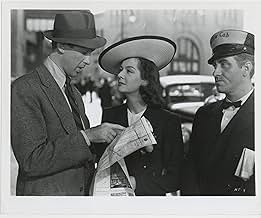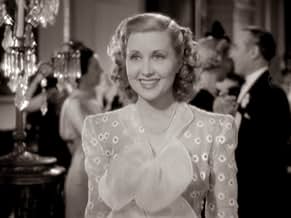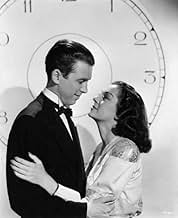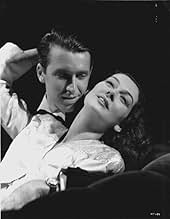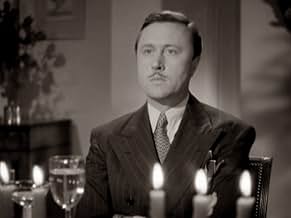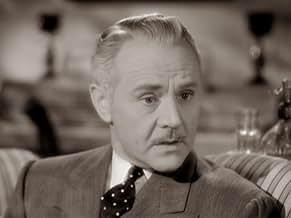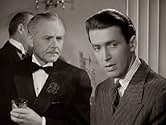Ajouter une intrigue dans votre languePlaywright Gaylord Esterbrook scores a hit with his first Broadway play, both with the critics and with leading lady Linda Paige. He and Linda are happily married until a patroness of the ar... Tout lirePlaywright Gaylord Esterbrook scores a hit with his first Broadway play, both with the critics and with leading lady Linda Paige. He and Linda are happily married until a patroness of the arts convinces Esterbrook to forget about comedy and concentrate on writing a tragedy. The e... Tout lirePlaywright Gaylord Esterbrook scores a hit with his first Broadway play, both with the critics and with leading lady Linda Paige. He and Linda are happily married until a patroness of the arts convinces Esterbrook to forget about comedy and concentrate on writing a tragedy. The end result nearly destroys his career and his marriage.
- Réalisation
- Scénario
- Casting principal
- Récompenses
- 2 victoires au total
- Philo Swift
- (as Charlie Ruggles)
- Frank
- (as Lawrence Grosmith)
- Actor in Show
- (non crédité)
- First-Nighter
- (non crédité)
- Waiter at Wyler's Party
- (non crédité)
- Police Sergeant
- (non crédité)
- Actor in Show
- (non crédité)
- Young Actress in Show
- (non crédité)
- Little Girl
- (non crédité)
Avis à la une
It also starred Laurence Olivier which leads me to believe the stage version has GOT to be a whole lot different than what we are seeing. Usually James Stewart and Laurence Olivier were never up for the same parts so their must have been a real big rewrite to make this part playable for James Stewart.
Imagine George Bailey if for amusement in Bedford Falls he wrote plays and you've got the character of Gaylord Estabrook who Stewart plays in No Time For Comedy. The film opens with the play about to open out of town and being produced by Clarence Kolb. Kolb has second thoughts though when he meets country rube Stewart from some small town in Minnesota and backs out of the production. But star Rosalind Russell has faith in the play and she pulls together the money to have it produced. Of course she falls for Stewart and they're married.
I don't know about you, but I sure can't see the future Lord Olivier playing the part as Stewart presents it.
The rest of the film is about Russell's and Stewart's marriage and the trials they're put through. Another married couple, Charles Ruggles and Genevieve Tobin, take an interest in each of them. Ruggles does well in a very unusual role for him, a sophisticated banker with pretensions to superiority.
No Time For Comedy is decidedly a second level entry in the credits of both the leads. Fans of Stewart and Russell should like it though.
Not having seen the original play, it's hard to say whether the film matches up to the original. At the time of the film, Spain was involved in a civil war, and all of Europe threatened by the Nazis; war was imminent. The play is about a playwright who is agonized by his success in the genre of sophisticated comedies when the world is such a serious place. It's also about several years into a marriage when the bloom has fallen off the rose.
The film "No Time for Comedy" is an uneasy mix of drama and comedy. Stewart, who normally plays a likable character, plays a country boy spoiled by success. He turns to drink and another woman, making him much less likable. Yet the audience is set up from the beginning to think he's going to be a nice guy. Russell, of course, plays the stage actress (which she was) beautifully. As Gaylord's suffering wife, she is dignified and sophisticated and you can see her broken heart beneath the veneer. Louise Beavers is fabulous as the maid who is not only an equal in the household but acts on stage as well.
Part of the problem with "No Time for Comedy" is that nowadays, we know the importance of comedy in times of tragedy. In fact, it's always time for comedy, never more than when there's a dark pall over the world. Despite good performances, the movie seems dated today, as I suspect would the play.
Stewart shines in this first part, clearly in his natural element. The movie's problem is Gay's sudden personality shift from down-home charming to churlish alcoholic. At the same time, the movie's mood and substance also alter and in unpleasant ways. I guess maid Clementine's (Beavers) snappy remarks are supposed to carry the comedic aspect, but unfortunately they're more caustic than funny. Then too, the plot becomes pretty implausible as Gay hooks up with ditzy Amanda (Tobin), and we're supposed to believe that their lengthy relationship never gets intimate. But then if it did, we wouldn't be as accepting of the movie's upshot.
On the other hand, the acting is good, except maybe for Tobin, but the real problem is with script and direction and the sudden rupture into mismatched parts these entail. The basic idea of a naïve rural lad trying to adjust to urban sophistication remains a workable one. But it needs a smoother more plausible treatment, especially with the transition, than it gets here. Sorry to say that, all in all, the 90-minutes amounts to a waste of outstanding movie performers.
What is interesting here is the cultural mirror of the times. The amusing portrait of a cynical Manhattan is still recognizable, and the thesis that in bad times there is nothing more important than making people laugh is the same one Preston Sturges explored in his overrated SULLIVAN'S TRAVELS a year or so later. Though this film doesn't mix comedy and message drama as well as Sturges did, however imperfectly, the penultimate scene here is intriguing. Russell is prepared to marry the droll plutocrat whose wife has stolen Stewart from her, but he lets loose with a string of invective that probably accurately reflected the 'America First' Republicanism of the time. Russell decides that she'd rather be with a man who hates the fact that the free world was being taken over by fascists than by a man who sees all dictators with cynical detachment.
This film is heavy and crude where it should be light, and the implied sexual sophistication of the plot is not directed or played with the right tone at all. But this misfire will still manage to be of interest to some.
Le saviez-vous
- AnecdotesWhen Linda blows out Carrell's match in the bar, she's reacting to the old "three on a match" superstition.
- GaffesA montage dramatizing Gaylord's writers block includes three day & date calendar pages. The first two calendar pages are consistent with the year 1938, but the closest years for which the third page would be correct are 1930 or 1941.
- Citations
Gaylord 'Gay' Esterbrook: [speaking to his wife Linda] Well, now, just what's behind that dark innuendo?
Clementine, Actress in Show: Aint nothing behind me, boss.
- ConnexionsFeatured in MsMojo: Top 10 Funniest Bloopers from Classic Hollywood Movies (2023)
- Bandes originalesThe Wedding March
(1843) (uncredited)
from "A Midsummer Night's Dream"
Music by Felix Mendelssohn
Played after the wedding
Meilleurs choix
- How long is No Time for Comedy?Alimenté par Alexa
Détails
- Date de sortie
- Pays d’origine
- Langue
- Aussi connu sous le nom de
- No Time for Comedy
- Lieux de tournage
- Société de production
- Voir plus de crédits d'entreprise sur IMDbPro
- Durée1 heure 33 minutes
- Couleur
- Rapport de forme
- 1.37 : 1
Contribuer à cette page



